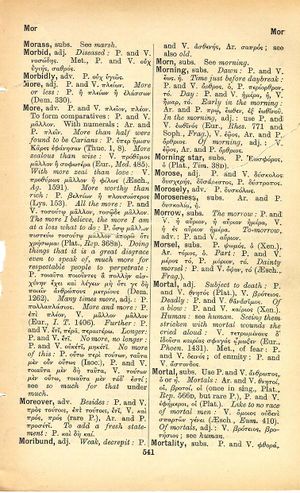mortal
τίκτει γὰρ κόρος ὕβριν, ὅταν πολὺς ὄλβος ἕπηται ἀνθρώποις ὁπ̣όσοις μὴ νόος ἄρτιος ἦι → satiety breeds arrogance whenever men with unfit minds have great wealth
English > Greek (Woodhouse)
adj.
Subject to death: P. and V. θνητός (Plat.), V. βρότειος. Deadly: P. and V. θανάσιμος. Of a blow: P. and V. καίριος (Xen.). Human: see human. Seeing them stricken with mortal wounds she cried aloud: V. τετρωμένους δʼ ἰδοῦσα καιρίας σφαγὰς ᾤμωξεν (Eur., Phoen. 1431). Met., of fear: P. and V. δεινός; of enmity: P. and V. ἄσπονδος. subs. Use P. and V. ἄνθρωπος, ὁ or ἡ. Mortals: Ar. and V. θνητοί, οἱ, βροτοί, οἱ (once in sing., Plat., Rep. 566D, but rare P.), P. and V. ἐφήμεροι, οἱ (Plat.). Like to no race of mortal men: V. ὅμοιος οὐδενὶ σπαρτῶν γένει (Aesch., Eum. 410). Of mortals, adj.: V. βρότειος, βροτήσιος; see human.

